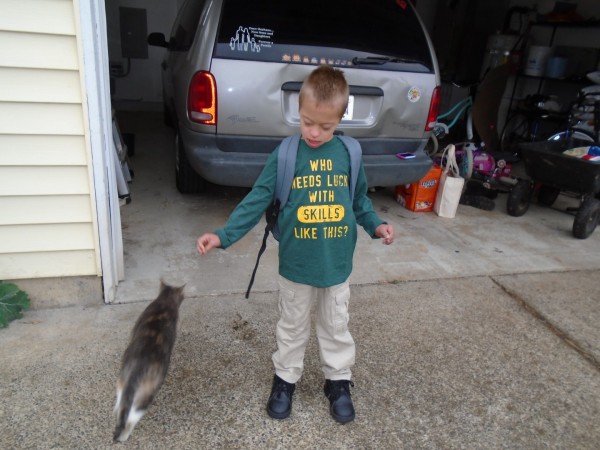Here’s a look inside Jordan’s attachment development via his back-to-school note this week.
Intro for new readers: Jordan was adopted into our family from a Eastern European orphanage when he was 2 1/2 years old. He is 7 years old now and has Down Syndrome. Usually though, it’s his time socially neglected in his orphanage crib that affects him more than his chromosomes. His perception of the world and other people is so different due to those 2 1/2 years spent alone. He has a great team at school, but adoption/attachment issues and Down Syndrome are an unusual combination and I wrote this letter to give his team a head start towards success.
September 6, 2016
Dear “Teacher” and all of Jordan’s wonderful team,
Please take the time as soon as possible to read this update and the first of the connected articles listed below. I’m looking forward to working with you this year and am glad to have you on our/Jordan’s team.
~Mom
New school year notes:
• [… some other stuff and then:]
• The biggie: “Orphanage behavior†– continued below
Jordan is a little guy with Down Syndrome. He is learning self-control and sometimes he avoids work out of laziness. But when he acts out he is usually driven by his developmental years in the orphanage. I hear it from seasoned social workers, therapists, parent peers and other professionals involved in helping to rehabilitate children from institutional backgrounds, so please give my words due weight. Jordan has an attachment disorder that causes him to seek control of his environment.
Jordan is a sweet boy, but he doesn’t behave like a nice person when he is manically controlling his environment. He is not learning. Controlling might not be the perfect word, it’s just the closest I can get. It’s not a power struggle and it’s not out of curiosity. He controls his environment for a primal, visceral need for safety. And he does it by doing things he knows you don’t want. It’s a demand for structure and follow-through. He needs his people to follow through to show themselves trustworthy and competent.
If he is able to manipulate his aides, he reverts to these behaviors out of a sort of gut-level fear. He usually giggles and laughs in a wild sort of way and behaves hyperactively. When he is stripping, peeing, peeing where he shouldn’t, grabbing, swiping, running, or flipping light switches, he knows what he is doing is not acceptable behavior, but is not able to control himself, because he is driven by fear and needs us to help him feel safe.
At the moment this starts, which may very well be the moment he arrives at school and continue more intensely for several weeks, STOP EVERYTHING. Have him sit down (chair, floor, corner… so long as it is your choice) until he can sit politely. If he swipes, grabs, throws, slaps, or tries to run off, he should return to sitting. It’s a place of safety. It’s where he has a chance to let his fear cool and his trust grow.
At this point, with somebody he trusts, we can work towards more and more interesting and challenging tasks. He knows you there, so you will get some of this! But it’s been a whole summer and he is developmentally another leap ahead from where he was last year. So I think he is going to test you with a new level of understanding.
With somebody he is still testing, he will fight and fight (adoption counselors describe Jordan’s perspective as feeling like he’s literally fighting for his life) and have periods of exhaustion and tears. Any amount of yield/trust is important to praise immediately. It’s also important that the whole scenario play out with no anger on the adult’s part. We are there helping him find safety. We love him and want his success. Our eyes express love, our postures express patience… and we are strong and resilient and able. That’s the kind of leader he is willing to follow.
It is 1000% worth it to spend lots of time practicing “safe sitting†or “strong sitting†so that you have a foundation of trust to build upon. If he misses art or recess or potty time, etc. that’s too bad, but I expect it will take a fair amount of practice to be able to work up to doing those tasks. It’s my hope that you will be able to help him through these issues and be able to participate in more school activities than ever before. He is developmentally ready for them too! But feeling safe comes first.
I can foresee some challenges if he is not ready to comply but he needs to have his diaper changed or go to the bus, etc. I’m not sure what the best options are for that. Sometimes we just do the best we can.
This is the system that is in place to help him succeed and thank you in advance for your participation. This method and understanding comes from a well-researched and understood background. Because of his developmental delay and being non-verbal, we’re not sure exactly which attachment disorder Jordan has, but we can learn a lot about how Jordan’s brain works by learning about kids with RAD. Here are a few links that will help you gain insight into working with a post-institutionalized child with high baseline anxiety and poor attachment foundation. I think you’ll find them both interesting and useful. Let me know as you see additional needs and have questions.
http://www.attachment.org/letter-to-teachers/
http://www.attachment.org/letter-to-bus-drivers-and-monitors/
http://www.attachment.org/teachers/consequences/
http://www.attachment.org/attachment-disorder-articles/

